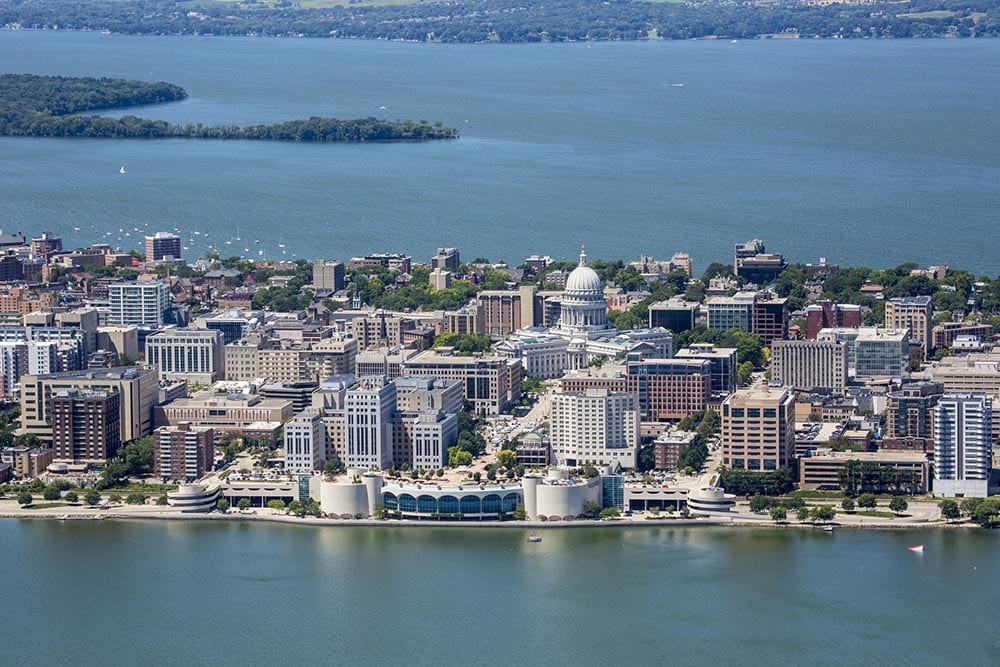Mission & History
Mission
Common Wealth Development is a private non-profit community development organization incorporated in 1979.
Our mission is to support and preserve the vitality of neighborhoods in the Madison Metropolitan area. Our work serves as the foundational bedrock of healthy community and economic development, with projects aimed at improving the housing and business climate of our neighborhoods through a people-first approach centered on racial justice and community level health improvement.
Core Program Areas
- Support developing businesses through affordable space and business incubation
- Coach youth and adults in financial fluency, job readiness and entrepreneurial leadership
- Provide safe, stable housing opportunities for renters and aspiring homeowners
- Integrate comprehensive community health approaches to city-wide violence prevention efforts
- Support the retention and sustainability of affordable land in Madison and Dane County
History
Neighborhood Beginnings
Through the 1970s and early 1980s, Williamson Street was in decline. The light industries and agriculture-related businesses, which had historically been the backbone of the neighborhood’s economy, either moved or died out, leaving many empty buildings and no jobs. For example, when La Samaritaine Co-op bought their buildings on the 1000 block in 1982, the derelict buildings were infested with mice and cockroaches. The perceptions of the condition of Willy Street were having a detrimental effect on the entire neighborhood.
There was a significant need for affordable housing created as if people mattered, the cultivation of a local economy, and workforce training. In an attempt to preserve the integrity of the neighborhood, the neighbors founded Common Wealth Development in 1979.

Community-Building through Willy Street Fair
To bring the community together again, local artists, musicians and engaged neighbors organized the first-ever “Willy Street Fair” on the third weekend in September, 1977. Their vision was a community model which included a tool lending library, a neighborhood recycling program, cooperative housing, and affordable housing for low-income families. Two years later, on February 14th of 1979, these same artists, musicians and neighborhood residents used the revenue and community support from the fair as the foundation for Common Wealth Development.
Now, the fair is a major neighborhood event and fundraiser held in collaboration with the Wil-Mar Neighborhood Center, who became a key partner in 2000.
HEALTH EQUITY AS VIOLENCE PREVENTION
Genealogies: Violence Prevention through Health Equity
Common Wealth Development uses a racial justice and health equity approach to our violence prevention work. The cornerstones of this work include reducing health inequities by providing safe and healthy housing, supporting economic stability and reducing the likelihood of violence through workforce development and business incubation and leveraging community resources and outreach activities to enhance social cohesion.
Community Engagement
Common Wealth Development is a community development organization, centered in a belief in strong neighborhoods and support for neighbors. Starting with the Willy Street Fair, community engagement efforts have always been the driver of our work – efforts ranging from establishing the Tool Lending Library, promoting the Yahara River Parkway, to creating the Willy St. Park on the corner of Willy St and Brearly St by acquiring a conservation easement. Our Board and staff have always been and will always be ready to support neighborhood efforts aligned with our mission and vision for a healthy Madison.
This work has only grown throughout the years, and now includes hosting community events such as Table Talks in the Meadowood neighborhood and workshops to re-invigorate residents to become better acquainted with neighbors and discuss issues in the community. This also includes our ongoing support of the Violence Prevention Coalition, led by Public Health of Madison and Dane County.
Housing Improvements
Since its inception, Common Wealth has pioneered new housing models and participated in several successful renovations throughout the City of Madison.
In 1986, Common Wealth began renovating Vaughn Commons on the 1100 block of Williamson in order to provide transitional housing for survivors of domestic violence.
Common Wealth began new construction of the Falconer Cooperative in 1991, establishing one of the first projects to use low-income tax credits to replace a Quonset hut and two dilapidated houses. This was Common Wealth’s first experience with our own development, resulting in nine units of new affordable housing.
In support of the City of Madison’s efforts to support aspiring homeowners, in 1998 we established the Lease-to-Purchase homeownership program . The Lease-to-Purchase program provides one-on-one counseling to low-income people who want to buy a home. The family can then lease the building for a period of up to three years, while Common Wealth puts a percentage of their monthly rent into an escrow account. At the end of the three years, their deposits help with their down payment. In addition, Common Wealth uses its connections to help the prospective homeowner get the best possible mortgage rate.
In 2002, in close collaboration with neighborhood residents, Common Wealth began developing a sixty-unit, three-story building at the corner of Main and Thornton Streets on the Yahara River. After opening on September 1, 2003, Yahara River View Apartments offers a mix of studios, one-, two-, and three-bedroom units at substantially below-market rent. Fifty-five of the units are available for people with incomes at or below 40% to 60% of county median income, and the other five units are rented at market rate.
In 2021, Common Wealth completed work on the Alliance at Meadowood Park, a mixed use building with 11 below-market rent apartments, and home to Common Wealth’s West Madison Office, where we are joined by staff from Dane County’s Joining Forces for Family program.
Additionally, in 2023, Common Wealth teamed up with The Road Home to provide management services for 15 units in the Meadowood neighborhood, which The Road Home owns in support of their Housing and Hope programming.
To date, Common Wealth has created, renovated and/or rehabbed 160 properties now available for rent: 114 on the east side and 46 on the southwest side in Madison’s Meadowood neighborhood.
Business Development
Common Wealth’s first commercial development was the 1982 renovation of the old Baumann Paint store at 409 S. Few Street. CWD found a tenant (Williamson Bicycle Works), assembled a financial package, and helped the owner put together a business plan.
In 1985, the Willy Street Co-op expanded at its old location on the corner of Willy St. and Few St and, once again, Common Wealth provided business planning for the expansion.
After demonstrating our tremendous expertise in business incubation and building a reputation for having successful projects, Common Wealth developed our first incubator Madison Enterprise Center (MEC) in one of the old Gisholt Machine Co. Buildings on Baldwin St. In 1986, this project made Common Wealth a Wisconsin pioneer in business incubation. Now we work in tandem with our partner Madison Gas and Electric, which owns the building, and together, we continue to strengthen opportunities for start-up businesses.
In 1996, we opened our second business incubator Main Street Industries, at the corner of Brearly and Main Streets (formerly the Greyhound Bus depot), thanks to funding from the Charles Stewart Mott Foundation. This incubator was designed to provide affordable permanent space for young businesses and specifically, businesses that “graduated” from MEC. It took seven years to develop MSI due to difficulty getting financing , but the Charles Stewart Mott Foundation ultimately funded the project. MSI opened in 1996 and once again, Common Wealth Development was a Wisconsin pioneer in providing affordable permanent space for young businesses.
In collaboration with developer Marty Rifkin, Common Wealth co-developed the Third Lake Market at the corner of Willy and Brearly Streets. A neighborhood needs survey pointed to the need for a financial institution in the neighborhood, so Common Wealth was able to persuade Telco Community Credit Union (now Heartland Credit Union) to open a branch in the Market.
Common Wealth is also an active member of the Wisconsin Business Incubation Association. We regularly host incubator tours for business and educational groups.
Youth workforce development: Financial Literacy Through Financial Mastery
Common Wealth’s first foray into employment and training started with the Youth-Business Mentoring Program established in 1991. The Youth-Business Mentoring Program was inspired by local parents seeking help in finding jobs for their kids. With YBMP as the foundation, our trainings gradually expanded to all 4 main high school campuses in Madison. From there, Common Wealth has been successful at creating additional programming, tailored to meet the specific needs of middle and high school students.
In 2015 Common Wealth Development partnered with the City of Madison as the host organization for the Wanda Fullmore Youth Internship program (WFYIP). Since our first Youth Business Mentorship Program, Common Wealth Development has supported over 9000 youth in trainings and structured internships, focusing on developing mastery in personal finances and applied economics.
Employment support for adults: the southwest partnership and meadowood beginnings
In 2012, the Southwest Partnership (SWP) formed as a collaboration between Common Wealth, Orchard Ridge United Church of Christ (ORUCC), and Dane County’s Joining Forces for Families (JFF) to address chronic poverty, mobility, and associated concerns in the Meadowood neighborhood on Madison’s southwest side. To inform what work was most needed from the SWP, Common Wealth hired an organizer to conduct hundreds of interviews and conversations within the southwest community. Southwest Madison residents spoken to their day-to-day realities and challenges, and considered what opportunities they most needed in order to thrive. Throughout this process The SWP learned that families are often besieged by the cumulative effects of poverty, crisis, instability, and burdensome childcare costs– all of which are significantly impacted by residents’ struggle to find and maintain employment. SWP observed a complex and expanding matrix of family and community needs that cannot be sufficiently addressed by the local assistance available. Over time the service areas expanded into neighboring areas, forging new place-based partnerships along the way, and developing an overall vision for the SW corridor of Madison.
In 2017, Common Wealth Development officially established the Southwest Transitional Employment Program (STEP)—a central component of the SWP—as a program area within the organization’s Economic Development activities.

innovations in community based-crime reduction: Broadening the vision for west madison
From 2018 – 2022 Common Wealth Development served as the community partner in The Community Based Crime Reduction grant initiative that was funded by the US Department of Justice (DOJ). Through this work, established in partnership with the City of Madison Police Department, Community Development Division, and a local researcher, we were able to foster community organizing, engagement, and participation. Based on input from the area’s residents, the project’s multi-focused goals include supporting parents, engaging youth, and incorporating community policing in the neighborhood. Throughout its 4 years, the CBCR partnership funded mentorship initiatives, driver’s licensing and fatherhood projects, community engagement activities, community policing and a community safety worker pilot and a safe passage program.
Some of the organizations funded under the grant were Charles Hamilton Houston-Dear Dairy; 100 Black Men of Madison-Project Soar; Intentional Mentoring; Operation Fresh Start-Drive; Toki Middle School-Family and Community Engagement, Meadowood Neighborhood Center, Mellowhood Foundation-People on Premises, Urban League of Greater Madison-Fatherhood Initiative, Madison Police Department community policing efforts and Focus Interruption-Community Safety Worker pilot.
Common Wealth Development is laying the groundwork for a future Volunteer Income Tax Assistance (VITA) site in partnership with the WI Department of Revenue, Meadowridge Library, and Meadowood Neighborhood Center. By bringing a VITA site to Southwest Madison in 2024, we will significantly help low to moderate income taxpayers file their income taxes free of charge, which saves tax filing fees and allows individuals to take advantage of tax credits that might be overlooked.

990 Form
You can request our 990 form by emailing info@cwd.org
